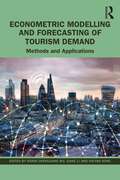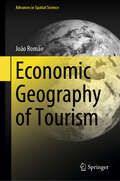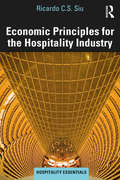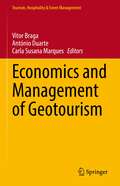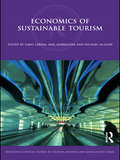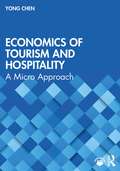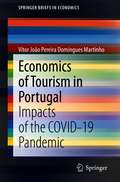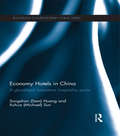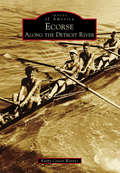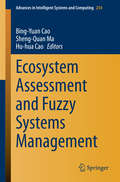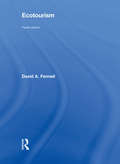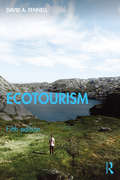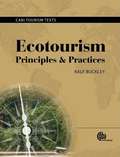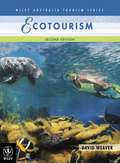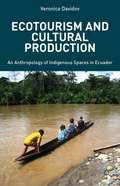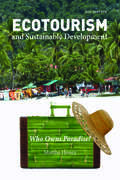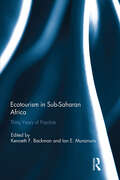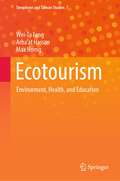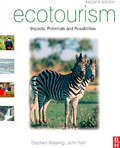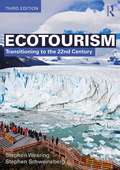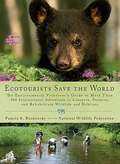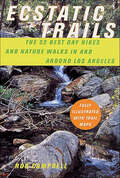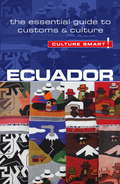- Table View
- List View
Econometric Modelling and Forecasting of Tourism Demand: Methods and Applications
by Doris Chenguang WuThis insightful and timely volume provides a succinct, expert-led introduction to the latest developments in advanced econometric methodologies in the context of tourism demand modelling and forecasting. Written by a plethora of worldwide experts on this topic, this book offers a comprehensive approach to tourism econometrics. Accurate demand forecasts are crucial to decision-making in the tourism industry and this book provides real-life tourism applications and the corresponding R code alongside theoretical foundations, in order to enhance understanding and practice amongst its readers. The methodologies introduced include general to specific modelling, cointegration, vector autoregression, time-varying parameter modelling, spatiotemporal econometric models, mixed-frequency forecasting, hybrid forecasting models, forecasting combination techniques, density forecasting, judgemental forecasting, scenario forecasting under crisis, and web-based tourism forecasting. Embellished with insightful figures and tables throughout, this book is an invaluable resource for those using advanced econometric methodologies in their studies and research, including both undergraduate and postgraduate students, researchers, and practitioners.
Economic Effects of the Pandemic: Implications for the Economy, Finance and Tourism (The Political Economy of the Middle East)
by Ashraf MishrifThis book addresses the impact and implications of the COVID-19 pandemic, one of the most challenging public health risks to human wellbeing, on the economic activities and behaviors of Middle Eastern countries during and in the aftermath of the pandemic. It provides detailed examination of how the global and Middle Eastern economies incurred significant financial and economic damages, human losses, and hundreds of millions of people losing their jobs. The analysis of this book is entirely based on primary data and a mix of quantitative and qualitative research methods to accurately account for the effects of the pandemic on the economy, finance, and tourism. While providing in-depth analysis of the macro and micro economy at global and national levels, the book investigates the impact of the pandemic on human behavior including household and water consumptions in the GCC countries, as well as offering potential green strategies for sustainable recovery in the post-pandemic era. As well as explaining the negative effects of the pandemic on the tourism and hospitality industries, the book also offers some positive outcomes from the pandemic, most notably in the innovation and IT sector and creative approaches in banking practices and services to ensure financial stability and sufficient liquidity in the market. Readers, students, researchers, industry practitioners and policy makers will benefit from the new insights offered by a diverse group of senior researchers and experts from across the world.
Economic Geography of Tourism (Advances in Spatial Science)
by João RomãoThis book provides an in-depth exploration of the dynamic intersections between economic geography and tourism, highlighting how spatial, economic, and social processes shape tourism development—and how tourism, in turn, transforms economic spaces. Combining theoretical insights with real-world case studies, it offers a comprehensive understanding of tourism&’s evolving role within economic geography. The first part lays a strong theoretical foundation, introducing key concepts such as the Tourism Area Life Cycle, path dependence, agglomeration economies, smart specialization, and regional resilience within the context of tourism research. It explores spatial and temporal patterns in tourism development, the growing influence of digitalization and smart tourism, and the roles of innovation and competitiveness in shaping destination dynamics. The second part shifts focus to tourism&’s broader economic and social implications. It critically assesses urban tourism&’s links to gentrification, circular economies, and social conflicts while exploring strategies to address spatial enclaves and foster integrated tourism networks in low-density and fragile regions. Environmental challenges, including the impact of tourism mobility on local communities and ecosystems, are also examined. The book concludes by addressing the tensions and future trajectories of tourism development, questioning whether sustainable or regenerative tourism can thrive within market-driven economies where decision-making prioritizes individual preferences over collective well-being. It calls for a reassessment of contemporary policy and regulatory frameworks to align tourism with broader economic and environmental goals. By bridging economic geography and tourism studies, this book equips scholars, policymakers, and practitioners with analytical tools to rethink tourism development and advocate for strategies that are economically viable and effectively sustainable, inclusive and resilient.
Economic Principles for the Hospitality Industry (Hospitality Essentials Series)
by Ricardo C.S. SiuEconomic Principles for the Hospitality Industry is the ideal introduction to the fundamentals of economics in this dynamic and highly competitive sector. Applying economic theory to a range of diverse and global hospitality industry settings, this book gives the theory real-world context. Looking at critical issues around sustainable economic development in the hospitality industry such as diversification, technology, determinants of demand, and pricing, it enables students to effectively conduct business analyses, evaluate business performance and conduct effective improvements over time. Written in an engaging style, this book assumes no prior knowledge of economics and contains a range of features, including international case studies and discussion questions, to aid beginners in the subject. This will be an essential introductory yet comprehensive resource on economics for all hospitality students.
Economics and Management of Geotourism (Tourism, Hospitality & Event Management)
by Vitor Braga Carla Susana Marques António DuarteThis book covers all aspects of the economics and management of geotourism, an increasingly important sector of nature tourism that focuses on the geology and landscape of different territories, providing a pleasurable and educational tourist experience. Geotourism is a sustainable form of tourism that has the potential to deliver significant benefits to host communities. To date, however, geotourism has been examined primarily from the natural sciences perspective, to the detriment of issues related to local social and economic impacts, inter-organizational collaboration, tourist responses, and community participation. This book therefore fills a major gap in the literature. While a key focus is the impacts of geotourism on economic and social development processes and the quality of life of local populations, detailed attention is also devoted to topics such as geopark and geosystem management, innovative and entrepreneurial strategies in geotourism, and territorial marketing. In addition, readers will gain a clear understanding of the extent to which the opportunities and challenges facing geotourism reflect current trends in the tourist industry as a whole.
Economics of Sustainable Tourism (Routledge Critical Studies in Tourism, Business and Management)
by Fabio CerinaTourism is one of the world's largest industries and one of its fastest growing economic sectors helping to generate income and employment for local people. At the same time, it has many negative outsourced effects on the environment and local culture. Achieving a more sustainable pattern of tourism development is high on the global agenda aiming to meet human needs while preserving the environment now and for the future. The Economics of Sustainable Tourism aims to critically explore how tourism economic development can move closer to a sustainable ideal from a firm economic analytic anchor. Grounded in economic theory and application it analyzes tourist’s satisfaction and impacts of tourism on the host community, investigates the productivity of the industry and identify factors which could increase economic and sustainable development such as trade relationships. It offers further insight into how destinations sustainability can be measured, economic benefits of a more sustainable destination and sets the agenda for future research. The book includes a range of theoretical and empirical perspectives and includes cutting edge research from international scholars. This significant volume provides a new perspective on the sustainable tourism debate and will be a valuable read for students, researchers, academics of Tourism and Economics.
Economics of Tourism and Hospitality: A Micro Approach
by Yong ChenThis book offers students an accessible and applied introduction to microeconomics in tourism and hospitality through a comprehensive analysis of the market mechanism, demand and supply, firm behavior and strategy, and transaction and institution. This book not only helps students to master core microeconomic theories that are essential for understanding the tourism and hospitality industry, but, more importantly, it guides students to analyze consumer behavior and firm strategy specific to the industry. Throughout the book, readers are guided to develop the economic analysis of tourism and hospitality that progresses from economic intuition to graphical representation and to mathematical quantification. Carefully corralled case studies showcase the applications of key microeconomic theories in solving a wide range of real-world problems, including Uber’s surge pricing, Airbnb’s supply adjustment, and McDonald’s and Burger King vying for prime locations. This book is written in an accessible style, illustrated with exquisite diagrams, and enriched with a range of other features, such as chapter summaries, review questions, and further readings to aid readers’ further understanding. By reading this book, students will be able to develop an economist’s way of thinking, which will enable them to analyze tourism and hospitality businesses in a rigorous and critical manner. This book is essential reading for all tourism and hospitality students and teachers.
Economics of Tourism in Portugal: Impacts of the COVID-19 Pandemic (SpringerBriefs in Economics)
by Vítor João MartinhoThis Brief discusses impacts of the COVID-19 pandemic on the Portuguese tourism sector. Taking into account real-world conditions and the importance of the tourism sector for the Portuguese economy, this book highlights the economic contexts of tourism in Portugal at the regional and municipal levels, discussing pre-pandemic economic frameworks and projecting potential implications for the future. Using data provided by Statistics Portugal, the Brief performs econometric analysis on three cases: new paradigms for overnight stays and guests, changes in tourism revenues and prospective alternatives, and a comparison of effects on changes in number of guests and overnight stays at the regional level. Providing cutting edge analysis of a dynamic global situation, this Brief will be useful for researchers interested in tourism economics and European economics as well as policymakers and industry professionals.
Economy Hotels in China: A Glocalized Innovative Hospitality Sector (Routledge Contemporary China Series)
by Songshan Huang Xuhua SunWhile economy or budget hotels have been popular in western countries since the end of the Second World War, they have only emerged as a sector in their own right in China since the mid-1990s. Indeed, as a new service industry sector, economy hotels in China demonstrate important characteristics which can be used to illustrate and help explain China’s current economic progress more generally. This book provides a comprehensive overview of the economy hotel sector in China. It covers macro-level social-cultural, economic, environmental, geographic and development issues, alongside micro-level consideration of the budget hotel companies’ innovative management and marketing procedures, business expansion strategies, general hotel management and operation issues, as well as an analysis of some leading entrepreneurs in the sector, and in-depth case studies examining the most successful economy hotel companies in China. Huang and Sun argue that the rapid development of budget hotels in China demonstrates how, under the influence of globalisation, Chinese businesses have become more innovative as they apply successful western business models to China. In turn, they show that the China model is fundamentally different in terms of its driving force, which lies purely in its domestic travel market, fuelled by China's continued economic growth. There is therefore much to explore about both China’s market situation and business practices in the economy hotel sector and this book makes an important contribution to our understanding of China’s new business environment. Based on extensive fieldwork and investigation, Economy Hotels in China will be welcomed by students and scholars of tourism, hospitality, business studies and Chinese studies, but it will also appeal to practitioners of business management in these sectors who are interested in China’s development and business opportunities in China.
Ecorse: Along the Detroit River
by Kathy Covert WarnesFrench explorers called the Ecorse River the "river of bark," or Ecorces, because the Huron Indians who lived in the villages surrounding it wrapped their dead in the bark of the birch trees that grew along its banks. White pioneers settled on French ribbon farms along the Detroit River, and a small village called Grandport sprang up where the Ecorse River met the Detroit River. By 1836, Grandport, now known as Ecorse, had grown into a fishing and farming center, and, by the 1900s Ecorse had gained fame as a haven for bootleggers during Prohibition, an important shipbuilding center, and the home of several championship rowing teams.
Ecosystem Assessment and Fuzzy Systems Management
by Bing-Yuan Cao Sheng-Quan Ma Hu-Hua Cao"Ecosystem Assessment and Fuzzy Systems Management" is the edited outcome of the 3rd International Conference on Ecosystem Assessment Management (ICEAM) and the Workshop on the Construction of an Early Warning Platform for Eco-tourism (WCEWPE) in Hainan on May 5-12, 2013, Haikou, China. The 3rd ICEAM and the WCEWPE, built on the success of previous conferences, are major Symposiums for scientists, engineers and logistic management researchers presenting their the latest achievements, developments and applications in all areas of Ecosystem Assessment Management, Early Warning Platform for Eco-tourism and fuzziology. It aims to strengthen relations between industry research laboratories and universities, and to create a primary symposium for world scientists. The book, containing 47 papers, is divided into five parts: "Ecosystem Assessment, Management and Information"; "Intelligent Algorithm, Fuzzy Optimization and Engineering Application"; "Spatial Data Analysis and Intelligent Information Processing"; "Tourism Culture, Development and Planning" and "Application of Operations Research and Fuzzy Systems".
Ecotourism
by David A. FennellEcotourism continues to be embraced as the antithesis of mass tourism because of its promise of achieving sustainability through conservation mindedness, community development, education and learning, and the promotion of nature based activities that were sensitive to both ecological and social systems. The extent to which this promise has been realised is open to debate. Focusing on an array of economic, social and ecological inconsistencies that continue to plague ecotourism in theory and practice, the volume examines ecotourism in reference to other related forms of tourism, impacts, conservation, sustainability, education and interpretation, policy and governance, and the ethical imperative of ecotourism as these apply to the world’s greenest form of tourism. Ecotourism is a growing field attracting increasing attention from students and academics. Fennell provides an authoritative and comprehensive review of the most important issues that continue to both plague ecotourism and make it one of the most dynamic sectors in the tourism industry. It covers a comprehensive range of themes and geographical regions. Building on the success of prior editions, Ecotourism has been revised throughout to incorporate recent research and benefits from the introduction of real-life case studies and summaries of recent literature. An essential reference for those interested in Ecotourism, the book is accessible to students but retains the depth required for use by researchers and practitioners in the field. New chapters on the theory and application of animal ethics; community development in sustainable tourism; and education and learning in the field have added further value to an already very comprehensive volume. This book will be of interest to students across a range of disciplines including geography, economics, business, ethics, biology, and environmental studies.
Ecotourism
by David A. FennellThe new fifth edition of Ecotourism focuses on an array of economic, social and ecological inconsistencies that continue to plague ecotourism in theory and practice, and examines the sector in reference to other related forms of tourism, impacts, conservation, sustainability, education and interpretation, policy and governance, and the ethical imperative of ecotourism as these apply to the world&’s greenest form of tourism. Building on the success of prior editions, the text has been revised throughout to incorporate recent research, including ecotourism taking place in under-represented world regions. It includes new case studies on important themes in research and practice as well as learning objectives in each chapter. David Fennell provides an authoritative and comprehensive review of the most important issues, including climate change and UN Sustainable Development Goals. Ecotourism continues to be embraced as the antithesis of mass tourism because of its promise of achieving sustainability through conservation mindedness, community development, education and learning, and the promotion of nature-based activities that are sensitive to both ecological and social systems. The book debates to what extent this promise has been realised. An essential reference for those interested in ecotourism, the book is accessible to students, but retains the depth required for use by researchers and practitioners in the field. This book will be of interest to students across a range of disciplines including geography, economics, business, ethics, biology, and environmental studies.
Ecotourism
by Ralf BuckleyEcotourism is a useful concept, but not a very well defined one; it has been debated in theory and attempted in practice for nearly two decades. Its key goal is to reduce the net environmental impact of the tourism industry, via mechanisms including minimal impact management measures, education, community involvement, private conservation, contributions to public protected areas, expansion of ecotourism enterprises and mainstreaming of ecotourism principles. Focussing on fundamental ecotourism concepts, this broad-based textbook provides a basis for studies into environment-based tourism. It covers key topics such as the management, economics and potential environmental impacts both positive and negative of this popular and growing sector. Written for tourism students and an ideal resource for undergraduate courses, Ecotourism: Principles and Practices will also interest industry practitioners and researchers. Now you can access additional content items for this textbook. You can download pdfs of powerpoint slides as study aids and to assist in teaching the subject matter. This content is free to own and is available from Griffith University here
Ecotourism (Second Edition)
by David WeaverEcotourism, second edition has been thoroughly revised to reflect contemporary developments in ecotourism. Building on the strengths of the first edition, the text discusses the significance of ecotourism in the domestic and international tourism sector. Ecotourism origins, markets, venues and impacts form the basis of the first part of the book. Business aspects of ecotourism, external environments, organisations and policies are examined in the second part of the book, along with special environments and activities such as whale watching, islands, polar regions and indigenous territories. The management of ecotourism is covered comprehensively and is illustrated by extensive industry and destination examples derived mainly from the peer-reviewed literature. A highlight of the book is a regional survey of ecotourism that offers comparative insights into ecotourism in Australia, the South Pacific, Asia, Europe, the Americas and Africa. <p><p> Ecotourism is a high yield tourist category within the national tourism industry and issues such as site planning and development, operator obligations and best practices, strategic management and the role of indigenous communities have become crucial professional and industry considerations.
Ecotourism And Cultural Production
by Veronica DavidovEcotourism is a unique facet of globalization, promising the possibility of reconciling the juggernaut of development with ecological/cultural conservation. Davidov offers a comparative analysis of the issue using a case study of indigenous Kichwa people of Ecuador and their interactions with globalization and transnational systems.
Ecotourism and Sustainable Development, Second Edition: Who Owns Paradise?
by Martha HoneyEcotourism and Sustainable Development is the most comprehensive overview of worldwide ecotourism available today, showing how both the concept and the reality have evolved over more than twenty-five years. Here Martha Honey revisits six nations she profiled in the first edition--the Galapagos Islands, Costa Rica, Tanzania, Zanzibar, Kenya, and South Africa--and adds a fascinating new chapter on the United States. She examines the growth of ecotourism within each country's tourism strategy, its political system, and its changing economic policies. Her useful case studies highlight the economic and cultural impacts of expanding tourism on indigenous populations as well as on ecosystems.
Ecotourism in Sub-Saharan Africa: Thirty Years of Practice
by Kenneth F. Backman Ian E. MunanuraSince its first mention in the academic literature, ecotourism has been endorsed by NGOs and governments as the most environmentally sound and locally beneficial method of tourist development. Over the last thirty years sub-Saharan Africa has adopted ecotourism as the primary focus for tourism development; research into this has demonstrated mixed results. In this publication, we seek to explore the actual outcomes for African countries that have developed their tourism policy around the principals and values of ecotourism. The sheer scope and magnitude of the task means that a complete evaluation of ecotourism in Africa is impossible. Instead, included here are spot assessments of various aspects of ecotourism related to conservation, policy development, environment, governance, community and indigenous peoples in southern Africa. The studies cover a wide array of countries, including Botswana, Kenya, Tanzania, Uganda, Ghana, Zimbabwe, and South Africa. Though this is only the beginning of a needed long term evaluation of the positives and negatives of ecotourism, it provides a starting point from which to move forward. This book was originally published as a special issue of the Journal of Ecotourism.
Ecotourism: Environment, Health, and Education (Sinophone and Taiwan Studies #7)
by Wei-Ta Fang Arba'at Hassan Max HorngThis book bridges the gap on the critical issues of ecotourism and direct economic assistance to the conservation of local ecological and human resources. It covers various topics and case studies by ecotourism destination and ecotourism route from Sinophone and Taiwanese perspectives. Each chapter of this book includes comprehensive proposes as an important core value for planning and operating ecotourism. According to Sustainable Development Goals (SDGs), this book highlights our balanced understanding of sustainable tourism from the perspective of human ecology. Ecotourism needs to integrate the perspectives of population biology, bioanthropology, biomedicine, and public health and strengthen the connection between human ecology and disease. It is here to provide a comprehensive guide to all fascinating places for ecotourism courses. We encourage the following persons to read relevant chapters: (1) ecotourism entrepreneurs: business operators such as homestays, hot springs, ecological farms, and travel agencies; (2) ecotourism researchers: scholars and experts, university (specialized) college students, primary and secondary school teachers, and other ecotourism, environmental education, resource conservation, tourism and dining, leisure and recreation, other related fields researchers; and (3) ecotourism practice management and planners.
Ecotourism: Impacts, Potentials And Possibilities?
by Stephen Wearing John NeilEcotourism: Impacts, Potentials and Possibilities analyzes the impacts of mainstream tourism in first, second and third world countries, and argues the benefits of adopting the philosophical approaches of ecotourism to create a more sustainable tourism industry in every country around the world. Conservation and ecotourism issues are now at the forefront of public opinion. The decline of natural rainforests, loss of endangered species, global warming and land degradation have galvanized public support for conservation. Building on the success of the first edition, this text has been fully revised and updated to include: updated and new international case studies a new chapter devoted to the theory and technique of Rapid Rural Appraisal (the practice whereby communities are empowered to improve their own environment) questions and further readings at the end of each chapter to facilitate student's learning critical analysis of ecotourism explores the movement of ideas around post-modern approaches to the field. Using relevant case studies, Ecotourism examines the potential positive social and environmental benefits of ecotourism and is ideal for both students of tourism and practitioners within the tourism industry. Ecotourism will also be of interest to environmental groups, land managers, academics and planners.
Ecotourism: Transitioning to the 22nd Century
by Stephen Wearing Stephen SchweinsbergSince the first edition of the title, ecotourism has become a major phenomenon in tourism and society in many countries and regions throughout the world. The profusion of experiences has generated a variety of means of theorizing, analysing and marketing ecotourism, all that have yet to be encompassed in one book. Ecotourism fills the gap by synthesising the changes in thinking and society over the last decade. This third edition has been fully revised and updated to include: updated chapters addressing modern thought and discourse, including neoliberalism, consumer culture and quality management in the ecotourism industry; critical analysis drawn from a range of theoretical frameworks, which models and advances the thinking in ecotourism towards a socio-geographical analysis; new and international case studies from emerging markets such as China and Brazil. Providing a critical introduction to the analysis of tourism from a sociological and geographical perspective, the title is essential reading for higher-level and graduate students and researchers in tourism, sociology and geography. It will also be of interest to environmental groups and practitioners.
Ecotourists Save the World
by Pamela K. Brodowsky National Wildlife FederationA comprehensive guide to environmental and wildlife volunteer programs throughout the world. This unique site-by-site guide profiles more than 300 programs where volunteers can work in a variety of activities involving conservation and study of wildlife. From the Fur Seal Project of the Earthwatch Institute in St. George Island, Alaska, or identifying and tracking wildlife in the Limpopo Nature Reserve, South Africa, to Blue World Institute's Adriatic Dolphin Project in Croatia, to the tracking program of the Open Minded Project in Kaeng Krachan National Park, Thailand, readers will learn the best ways to "give back" and make the most positive environmental impact during their travels. Each entry includes a profile of the site and organization behind it, as well as location, contact information, category, costs, dates and duration, how to apply, and field notes that include any special concerns, requirements for participation, and suitability.
Ecstatic Trails: The 52 Best Day Hikes and Nature Walks In and Around Los Angeles
by Rob CampbellLos Angeles is a hiker's perfect playground: from enchanted canyons to bountiful beaches, the range of terrain provides an almost endless variety of trails, vistas, and even weather conditions. Organized by level of difficulty, beginning with the most forgiving trails and building up to the toughest, Ecstatic Trails emphasizes the experience of the hike, guiding you to romantic hikes, trails that are right for children, thrill hikes, day trips you can build around a picnic, or intense paths perfect for solitary exploration.Everything a novice hiker or experienced trailblazer needs is here, including:--detailed maps--driving directions--restrictions, including whether dogs are permitted--the amount of time each hike is likely to take--featured elements and trail descriptionsFrom wildflower walks to dramatic waterfall treks, from sunset outings to trails that provide cool breezes in the midst of summer, Ecstatic Trails is packed with a year's worth of happy hiking.
Ecuador - Culture Smart!
by Russell MaddicksSqueezed between Colombia in the north and Peru in the south, Ecuador is named for its location on the Equator and has a landscape so varied that it has been described as a microcosm of every microclimate found in South America. This diversity makes it a magnet for tourists, mountain trekkers, volunteers, and increasing numbers of US retirees looking for a warm, culturally interesting, economical, and safe place to spend much of their time. The country is booming, thanks to high oil prices and investment in tourism, and a massive infrastructure program and the poverty-reduction measures launched by President Rafael Correa have endeared him to the poorest in society. Ecuador's multiethnic population reflects a unique blend of cultures, from traditionally dressed mountain peoples, whose ancestors inhabited their highland villages before the arrival of the Incas, to the Afro-Ecuadorians of Esmeraldas and the Chota Valley and the tribal peoples of the Amazonian rainforest. The Ecuadorians are proud, friendly, hospitable, and hardworking, but to know them well the foreign visitor needs to understand the complex historical divisions between the highlands and the coast, and the rigid class and racial hierarchy that has shaped the country's history. Culture Smart! Ecuador takes you beyond the usual descriptions of where to go and what to see, and gives you an insider's view of the people, their history, their food, and their culture. Special sections are designed to help food lovers get the most out of the menu, assist business travelers to gain an edge on the competition, and show expats, volunteers, and visitors how to meet and get on well with the Ecuadorians, who are as diverse and varied as the country's amazing geography.
Eddy County (Images of America)
by Donna Blake Birchell The Southeastern New Mexico Historical SocietyEddy County's 4,198 square miles were carved from the massive land holdings of Lincoln County, then the largest county in the United States, on February 25, 1889. Early Spanish explorers and Native Americans had used the seemingly endless water supply of the Pecos River, which bisects the county, as a trail to the north. Seven Rivers, the first settlement in the Pecos Valley, battled the newly formed town of Eddy for the honor of remaining county seat. Eddy won by a vote of 331 for and 83 against. Although born in lawlessness and diversity, the county flourished as the discoveries of oil, gas, and potash brought industry to support the established fertile agricultural and cattle foundations. This volume explores the early founding families and pioneers and brings to light many of the long-forgotten towns of Dayton, Lookout, Oriental, and Globe that helped form the Eddy County of today.
